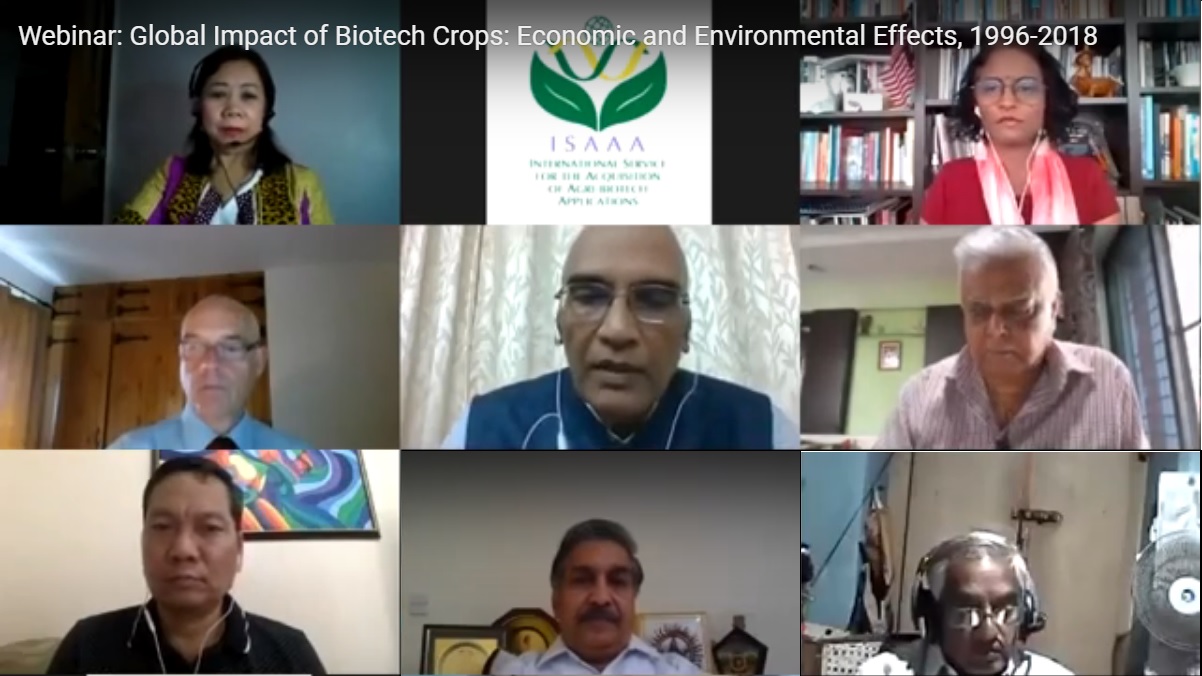
Indian Farmer Confirms Socio-economic Impact of Bt Cotton
October 21, 2020| |
Insect-resistant (IR) cotton has impacted the lives of Indian farmers since it was introduced in 2002. This is according to Graham Brookes of PG Economics Ltd, who was one of the speakers during the ISAAA Webinar Global Impact of GM Crops held on October 15, 2020. His data for the socio-economic impact of GM crops was supported by the success story of the Indian farmer, Mr. V. Ravichandran.
In 2018, 95% of Indian farmers are using Bt cotton technology. PG Economics data show that its yield impact is +29% and the average farm income gain amounts to US$ 193.56 per hectare. In terms of return on investment, a farmer earns an extra US$ 12.95 for every US$ 1.00 he spent on IR cotton seed. All these round up to a total farm income gain of US $24.31 billion with a production impact of 14.73 million tons of lint from 2002 to 2018.
Mr. V. Ravichandran, an influential farmer in India and Director of the Global Farmer Network, shared his 34-year cotton farming experience. Prior to planting Bt cotton, Ravichandran encountered the same problems that other cotton farmers had: yield loss due to pests, continuous application of pesticides, and pest-resistance to these pesticides. These led to a cycle that drained his resources. It took two years before Ravichandran decided to try Bt cotton because of the false stories he heard about the transgenic crop.
During a meeting organized by the South Indian Cotton Association in 2004, one of the experts suggested to Ravichandran to plant one acre of Bt cotton and another acre with non-Bt hybrid cotton and to compare the two. "I trust science always," he said. He followed the suggestion and added OPV for comparison. He found that Bt cotton planting was the cheapest and most profitable option. Ravichandran continues to enjoy the benefits of GM technology today.
The other resource persons during the webinar were Dr. C.D. Mayee, President of the South Asia Biotechnology Center, who talked about the impact of Bt cotton in India; Dr. K.C. Bansal of the Indian Agriculture Research Institute who explained the biosafety aspect of the biotech crops for Indian Agriculture; and Dr. Rhodora Aldemita of ISAAA who gave a brief overview of the global status of GM crop adoption in 2018. The webinar was moderated by Mr. Ram Kaundinya of the Federation of Seed Industry of India.
For more details, watch the full episode on the ISAAA Youtube channel.
| |
You might also like:
- GM Crops' Impact Creates a Halo Effect, Expert Explains
- Groups Push for Bt Brinjal Field Trials in India
- Indian Farmers Continue Their Efforts to Assert Right to Plant Herbicide Tolerant Cotton Seeds
Biotech Updates is a weekly newsletter of ISAAA, a not-for-profit organization. It is distributed for free to over 22,000 subscribers worldwide to inform them about the key developments in biosciences, especially in biotechnology. Your support will help us in our mission to feed the world with knowledge. You can help by donating as little as $10.
-
See more articles:
-
News from Around the World
- WHO Refers to GM Mosquitoes as Beneficial Technology
- Scientists Use Glowing Venus Flytraps to Understand Its Closure Mechanism
- Pamela Ronald is 2020 World Agriculture Prize Laureate
- Pinkglow™, Del Monte's Pink Pineapple Now Available
- Indian Farmer Confirms Socio-economic Impact of Bt Cotton
- Biotech Experts to Tackle Global Impact of GM Crops
- EFSA Study Concludes Maize MON810 Poses No Risk to Humans, Animals, or the Environment
-
Research Highlights
- Researchers Pinpoint Peanut Genes Linked to Salt and Drought Tolerance
-
Plant
- New Tool to Accelerate Crop Improvement with CRISPR
- New Genome Editing Tool Designed to Make Big DNA Edits
-
Health
- International Team of Scientists Identify Common Vulnerabilities in COVID-19 and Other Lethal Coronaviruses
- COVID-19 Virus Can Survive 28 Days on Surfaces
-
Read the latest: - Biotech Updates (February 18, 2026)
- Gene Editing Supplement (January 28, 2026)
- Gene Drive Supplement (February 22, 2023)
-
Subscribe to BU: - Share
- Tweet

